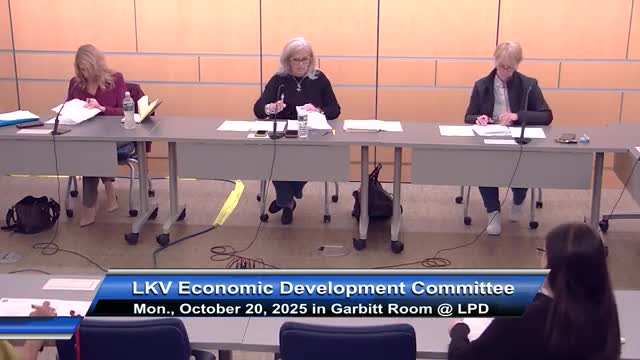Lakeville committee wins $94,000 planning grant; readies resident and business survey
Get AI-powered insights, summaries, and transcripts
Subscribe
Summary
The Town of Lakeville Economic Development Committee received a $94,000 Community One-Stop planning grant and agreed on next steps: a January survey of residents and businesses, a competitive procurement for a consultant, and initial work on a business guide and outreach event.
The Town of Lakeville Economic Development Committee learned on Oct. 20 that the town was awarded a $94,000 planning grant to develop an economic development strategy and accepted a timeline that includes a January survey of residents and businesses and competitive procurement of a consultant to do the study.
The grant award letter, dated Sept. 30 and described at the meeting as coming from the Executive Office of Economic Development and the rural development fund, will fund a two‑year project that the committee said must be completed by June 2027. Emily (staff member) said the scope included “existing conditions in town, a market analysis, opportunity analyses for commercial and industrial businesses” and fiscal and economic impact modeling tied to different development scenarios.
Why it matters: the committee has been reconstituted to help broaden Lakeville’s small commercial base and reduce taxpayer burden by identifying types of businesses and sites that could fit the town’s rural character. Committee members said the grant-funded strategy will underpin a town business guide, a searchable inventory of available commercial properties, and targeted outreach to potential tenants and brokers.
Committee members and guests discussed immediate next steps. The committee directed staff to have Emily attend a mandatory grant kickoff meeting on Nov. 6, to draft a request for proposals (RFP) for consultant services, and to bring a draft RFP back to the committee for review so the town can competitively procure the firm that will perform the market analysis and strategy work. Emily said she will prepare a draft RFP and sample scope based on the awarded amount and the sample scope used to support the application. The committee agreed the town will evaluate proposals on qualifications and approach rather than simply lowest price.
Valerie Glenn, president of the Chamber of Commerce, told the committee the chamber can help with outreach to small businesses, networking, and education. “Our mission [is] to promote and enhance the business climate and develop a positive economic environment and contribute to the betterment of the community,” Glenn said. She described the chamber’s mix of large and small members and its work to connect businesses to state and federal resources.
Survey and outreach: the committee agreed to distribute a two-part survey in January — one 20-question instrument for residents and one 20-question instrument for businesses — and to use a mix of SurveyMonkey (or a similar platform), QR codes, paper copies available at Town Hall and the senior center, and social media to reach respondents. The committee discussed but declined a paid mail insert because Emily reported an estimated cost of about $6,000 for an insert in town mailings. The committee asked Emily to compile submitted question drafts into a master list to be narrowed and voted on at the Nov. 17 meeting.
Procurement and timeline: Emily said the grant requires competitive procurement of the consultant and that the town should expect to complete the study by the grant’s June 2027 deadline. The committee set Nov. 17 as its next meeting to finalize survey questions and to review the draft RFP timeline. Emily will report back after the Nov. 6 kickoff meeting with the state on any reporting or grant requirements and deliverable schedule.
Business guide, property inventory and social event: committee members agreed to update the town’s business guide and discussed assembling a searchable inventory of commercial properties (for lease or sale) that could be used to market Lakeville to prospective tenants. Laurie Driscoll and Kristen Howard volunteered to compile five model community guides for the committee to review at the next meeting. The committee also discussed hosting a business “after hours” social event (target date suggested in February or spring) to connect local business owners, promote the survey, and encourage chamber membership; the committee said it will seek sponsors and identify two or three volunteers to organize the event.
Other technical and outreach notes: committee members highlighted constraints that could limit development, including water and sewer availability, and suggested the town emphasize local cost advantages such as lower municipal electric rates in recruitment materials. Emily noted that certain procurement or higher‑tier SurveyMonkey features (for duplicate detection or advanced reporting) may carry additional costs; the committee asked staff to collect those estimates before finalizing the distribution plan.
Votes at the meeting: the committee approved the minutes of Sept. 15, 2025, and later unanimously approved a motion to adjourn. The committee recorded a roll call at adjournment: Kilgore, Driscoll, Carboni and Howard voted in favor on the final motion to adjourn.
